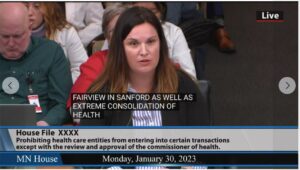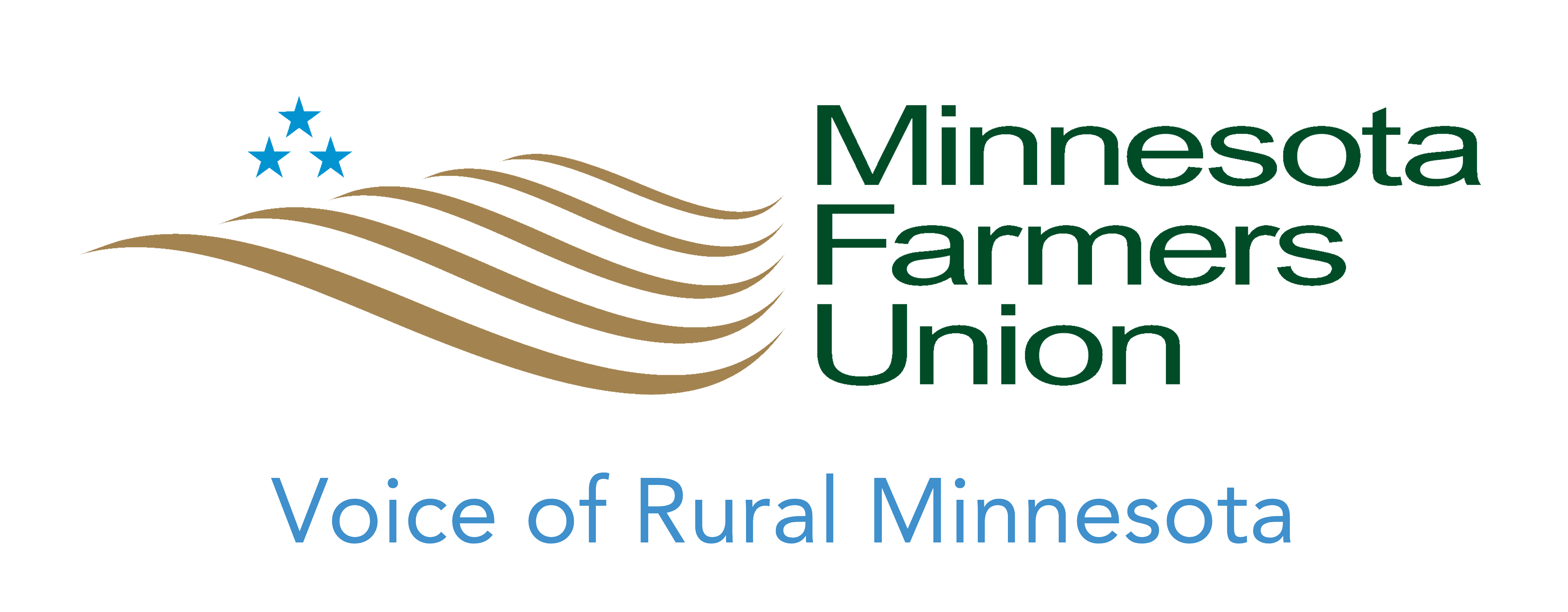Legislative Update: Driver’s license for all advances
LEGISLATIVE UPDATE: One month down, no signs of slowing, RFA funding, opposition to Sanford-Fairview merger, and new bill authors.

With the end of January, the state legislature is showing no signs of breaking pace. For MFU’s part, we’ve maintained a strong presence at the capitol, assisting members on our priorities, assisting with drafting and introducing legislation related to healthcare, competitive markets, local processing, and climate resilience, and testifying in committee. With an at times hectic session, we’ve worked hard to make sure our focus stays on priorities defined by members through our grassroots process.
On Monday evening, the Minnesota House passed a bill that would allow immigrants to earn a driver’s license (HF4). The bill, championed by Rep. Aisha Gomez (DFL-Minneapolis) in the House and Zaynab Mohamed (DFL-Minneapolis) includes data protections while ensuring that the Secretary of State and others have the information they need. MFU continued our support for this proposal and has heard from dairy farmers in particular for whom this is a priority.
“Our organization values the important role that immigrants play in our agricultural economy and community—as consumers, producers, processing employees, and farm workers,” said Gary Wertish, MFU President. “We believe that allowing immigrants to earn a drivers’ license would respect these contributions, improve public safety, and help farmers who rely on workers being able to travel to work.”
While not moving as quickly as ‘driver’s licenses for all’ or other proposals in the top tranche of bills introduced by DFL majorities in the first week of session, work has started on the agriculture budget with Senate and House members receiving overviews of the Governor’s budget proposal. These recommendations serve as the starting point for budget discussions and would allocate an additional $117 million to the Agriculture Department over the next four years.
His budget request is well-aligned with MFU priorities. In the first biennium, Walz proposed investments in:
- Meat Processing
- $500,000 in grants to startup or expand existing plants through the AGRI Value-Added Program –
- $150,000 to hire a meat processing liaison (leveraging $150,000 in federal funds)
- Soil Health & Climate Resilience
- $4 million to expand the Soil Health Financial Assistance program which provides equipment grants for farmers.
- $4 million Funding investments that improve water quality through the Ag Best Management Revolving Loan Program ($6 million in ’26-’27)
- $300,000to hire a Climate Coordinator to bring more federal money to Minnesota
- $5 million to establish a grain indemnity fund to protect farmers affected by elevator collapses
- $3 million to build out biofuels infrastructure, providing consumer access to higher blend fuels
- Resources for beginning and emerging farmers including:
- $700,000 to expanding the Emerging Farmers Office (EFO)
- $400,000 for equipment and infrastructure grants
- $500,000 for Services to immigrant and BIPOC farmers and food business
- $100,000 in funding for the Good Acre’s LEAFF program
- $300,000 to expanding staff capacity at the Rural Finance Authority (RFA)
- $150,000 to expanding the MN Grown program
- $500,000 to providing entrepreneurial support through expanding the New Markets Cost-Share program
- $1.5 million to replenishing the ag emergency account to prepare for animal diseases
- $500,000 to expand farm safety outreach and equipment grants and improving mental health outreach and services
- $800,000 in funding for noxious weed programs
- $700,000 in grants to Farmers Market hubs for aggregation, staff training, and program development
- $300,000 to hire an additional international trade representative at MDA
- $200,000 for pollinator research at the University of Minnesota
- $400,000 in new support for county fairs
The governor’s budget for agriculture also proposes updating MDA’s technology to improve service, modernizing and streamlining food licensing, securing funding for the RFA’s bonded loans, and other investments.
One bill that continues to move quickly—and with strong support from MFU—would authorize the Rural Finance Authority to borrow an additional $50 million to replenish their revolving loan account. This supports the agency’s Beginning Farmer Loan and other popular loan programs and would prevent the RFA from running out of funding later this year.
“While our members are diverse in their operations, they are unified in the fact that affordable financing often presents a significant challenge,” said Wertish in written remarks to the committee. “We ask members to see that this is passed early in session so that this program can assist farmers with the start of the 2023 growing season. This will also allow MDA to lock in interest rates, hedging future uncertainty.”
Wertish’s testimony points out that there is good precedent of funding the RFA early, ahead of a full bonding package. In 2017, when the program was also facing a funding shortfall, funding was passed with bipartisan support and made effective in February that year. Again in 2020, full RFA funding was approved and signed by the governor in March. Chair Samantha Vang (DFL-Brooklyn Center) and Rep. John Burkel (R-Badger) carry aligned proposals in the House (HF463). And Chair Aric Putnam (DFL-St. Cloud) carries the proposal in the Senate (SF548) which will be heard this week.
Of course, other jurisdictions—notably taxes—have the capacity to make much larger investments in farmers. In all, Gov. Walz proposed approximately $8 billion in tax cuts primarily aimed at improving the lives of working families with children.
“For a middle-class family of four, the One Minnesota Budget could put $10,000 back in their pocket,” said the governor of his proposal. “We are delivering a transformational budget for Minnesotans, and I look forward to getting this done.”
Other committees have been starting budget work as well. On Thursday of this week, the State Government committee will hear from Attorney General Ellison about his budget request. The proposal requests investment in a revolving fund to support complex multistate litigation, which could help the attorney general join other states in taking on large companies over antitrust violations. It also proposes nearly doubling the staff in the Attorney General’s Antitrust Division—though that is just from 2.5 to 4.5 full time staff.
“MFU has been very supportive of the action the antitrust team has taken to address important aspects of the livestock industry and other agricultural products of importance in Minnesota, but this talented team is also very small with only 2.5 FTE attorneys,” said Wertish in a letter to House State Government Chair, Ginny Klevorn (DFL-Plymouth), pointing out that this is still fewer employees than other similar or smaller states including Connecticut (7 FTE), Colorado (6 FTE), Nevada (5 FTE), and Washington (10 FTE).
Also on the antimonopoly front, MFU’s leadership has been active in their opposition to the proposed merger between Sanford and M Health Fairview, which would create the largest operator of primary care clinics in the state. In addition to traveling across the state to the Attorney General’s listening sessions, MFU has worked to advance legislation that would provide the state with additional oversight over this consequential merger.
On Monday, MFU Vice President, Anne Schwagerl provided strong testimony in a joint house hearing in support of such legislation, stating that “greater Minnesota already has one of the most highly concentrated hospital markets in the entire country and studies show insurance premiums on the individual market are higher in areas with this extreme concentration, a particularly important issue for farmers and other self-employed entrepreneurs . . . Health care monopolies don’t just raise costs, they reduce services.”
Back to the Agriculture Committee, Vice Chair Kristi Pursell (DFL-Northfield) introduced her first agriculture bill—a bipartisan proposal to fund cooperative development grants at MDA. MFU has worked hard on this proposal in past sessions. We’re grateful for her leadership in helping farmers process and market more agricultural products locally, shortening supply chains and keeping more wealth in rural communities.
MFU has also secured authors on legislation to strengthen antitrust law, establish a grain indemnity fund, expand meat processing technical training, expand soil health grants, and other priority issues. For those who are watching the legislature closely, many of these proposals are awaiting ‘jackets’ from the attorneys who work at the legislature. More even than in past years, staff is managing an immense volume of bill introductions.
The first deadline for bills to be passed out of committee is March 10.
Finally, please sign up to join us for MFU’s Lobby Day on Wednesday Feb. 15. This will be a consequential year for state policy, and you can help shape it.
As always, if you have questions or thoughts about MFU’s legislative work, reach out to Stu at stu@mfu.org or (320) 232-3047.
